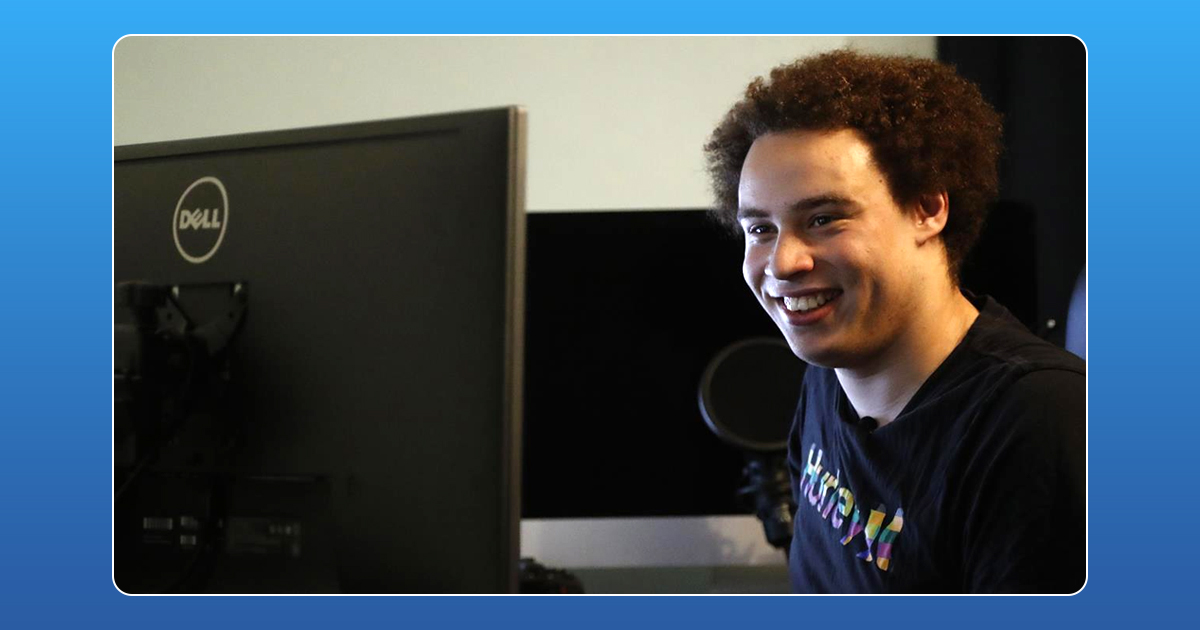Latest News
Marcus Hutchins: The Man Who Stopped WannaCry

On Friday 12th May, a malware that came to be known as WannaCry was gripping computers across the world and encrypting data. The only way one could get back one’s data was to pay the ransom the hackers were demanding in Bitcoins. This ransom amounted to around $300.
When Marcus Hutchins – also known as @MalwareTech, returned from lunch, he found that many National Health Services employees computers were infected by this malware. That’s when he realized it was something serious. The malware had already infected 74 countries and was rapidly infecting much more when he noticed that the ransomware kept searching for a URL after infecting a system. As long as the as the domain wasn’t registered, the malware would continue on with its journey.
Read more: WannaCry Ransomware: The Next Generation Blackmail?
With the intention to better understand the malware and monitor how it was spreading Marcus bought the domain for $10.69. The ‘Kill Switch’ was hardcoded into the malware in case the creators wanted to quickly deactivate the infection. While initial reports showed that they had caused the infection by registering the domain, it was actually the other way round. Registering the domain brought the infection to a standstill. His job is to look for ways to track and potentially stop botnets and other kinds of malware, Hutchins explained in his blog post.
But, he warns people that this is far from over as the attackers can realize how their malware was stopped, change the code and start again. Unfortunately, many reports suggest that other samples of WannaCry have emerged with different kill switch domains and also without the kill switch function.
Experts claim that the hackers seem to have raised $20,000 so far and the malware has effectively infected 150 countries including India. The best way to protect a computer against this malware, experts say is to update the patches for computers, have a backup for your data, and be wary of malicious content.
Latest News
D2C Brand Neeman’s Raises $4 Million for Tier 2/3 Store Expansion & Eco-Friendly Shoes

Hyderabad, January 13, 2026 Neeman’s, India’s leading D2C footwear brand famed for sustainable shoes and patented PIXLL® technology, has raised $4 million from existing investors. This funding boosts its cumulative capital past $10 million since 2015, with a post-money valuation nearing $50 million. CEO Vijay Chahoria emphasized offline retail as the “next frontier,” planning 50+ new stores in Tier 2/3 cities like Jaipur and Lucknow to blend eco-friendly innovation with hands-on customer experiences.
In India’s booming D2C ecosystem where footwear sales hit ₹1.2 lakh crore in 2025 Neeman’s targets hybrid retail amid high online CAC and 25-30% returns. Backed by vegan, machine-washable shoes priced ₹2,000-4,000, the brand leverages PIXLL® (5x more breathable than leather) for carbon-neutral comfort. Recent 5x revenue growth to ₹100 crore ARR, 1M+ pairs sold via Myntra and stores, and awards at India D2C Summit 2025 position it ahead of rivals like Paaduks.
Neeman’s offline expansion India eyes the $15B sustainable footwear market by 2028, fueled by PLI schemes, Gen Z’s 70% eco-preference (Nielsen), and Southeast Asia exports. Challenges like real estate costs are offset by data-driven inventory and omnichannel QR tech. Watch for Q1 2026 launches in Hyderabad and Bengaluru redefining D2C success through authentic, “Wear the Change” branding.
Latest News
Centre Mulls Revoking X’s Safe Harbour Over Grok Misuse

The Centre is weighing the option of revoking X’s safe harbour status in India after its AI chatbot Grok was allegedly misused to generate and circulate obscene and sexually explicit content, including material seemingly involving minors. The IT Ministry has already issued a notice to X, directing the platform to remove unlawful content, fix Grok’s safeguards, act against violators, and submit a detailed compliance report within a tight deadline. If the government finds X’s response inadequate, it could argue that the platform has failed to meet due‑diligence standards under Indian law, opening the door to harsher action.
Under Section 79 of the IT Act, safe harbour protects intermediaries like X from being held directly liable for user‑generated content, provided they follow due‑diligence rules and promptly act on legal takedown orders. Revoking this protection would mean X and its officers could be exposed to criminal and civil liability for obscene, unlawful, or harmful content that remains on the platform, including AI‑generated images from Grok. This prospect significantly raises X’s compliance risk in India and could force tighter moderation, stricter AI controls, and more aggressive removal of flagged posts.
The Grok episode also spotlights the regulatory grey zone around generative AI, where tools can create harmful content at scale even without traditional user uploads. Policymakers are increasingly questioning whether AI outputs should still enjoy the same intermediary protections as conventional user posts, especially when they involve women and children. How the government ultimately proceeds against X over Grok misuse could set a precedent for AI accountability, platform responsibility, and safe harbour interpretation in India’s fast‑evolving digital ecosystem.
Latest News
How Pronto Is Redefining 10-Minute Home Services in India with a $25 Million Fundraise

Home services startup Pronto is in advanced talks to raise about $25 million at a near-$100 million valuation, underscoring strong investor confidence in India’s fast-growing 10-minute home services market. This potential round would be the company’s third major funding milestone after its $2 million seed and $11 million Series A in 2025, backed by marquee investors such as General Catalyst, Glade Brook Capital, Bain Capital and new participant Epiq Capital. The fresh capital is expected to further strengthen Pronto’s positioning as a leading tech-led household help platform for urban consumers.
Pronto operates a 10-minute on-demand home-services platform that connects users with trained, background-verified workers for everyday tasks like sweeping, mopping, utensil cleaning, laundry and basic cooking. Using a hub-and-spoke, shift-based model, the startup stations workers at hyperlocal hubs, enabling sub-10-minute fulfilment and more predictable earnings compared to the informal domestic-help market. Founded in 2024 by Anjali Sardana and based in Delhi NCR, Pronto has already expanded from Gurugram into major cities such as New Delhi, Mumbai, Bengaluru and Pune, and is handling around 6,000 daily bookings with nearly 1,300 active professionals as of December 2025.
The upcoming $25 million fundraise is expected to be used to enter more metros, deepen presence in existing neighbourhoods with additional hubs and upgrade Pronto’s technology for smarter routing, shift planning and real-time operations. A significant portion of the capital will also go into training, retention and benefits for its workforce to maintain consistent service quality at scale, especially as competition heats up from rivals like Snabbit and Urban Company in the rapid home services space. This near-$100 million valuation not only validates Pronto’s model but also highlights a broader shift toward organised, tech-driven domestic-help solutions in India’s largely informal home-services market.














iwin
November 6, 2025 at 10:55 am
iwin – nền tảng game bài đổi thưởng uy tín, nơi bạn có thể thử vận may và tận hưởng nhiều tựa game hấp
GO88
November 9, 2025 at 9:59 am
Tham gia cộng đồng game thủ tại Go88 để trải nghiệm các trò chơi bài, poker phổ biến nhất hiện nay.
站群程序
November 9, 2025 at 10:31 pm
搭载智能站群程序,自动化搭建与管理,为SEO项目提供核心驱动力。站群程序
谷歌外推
November 12, 2025 at 10:58 am
采用高效谷歌外推策略,快速提升网站在搜索引擎中的可见性与权重。谷歌外推
MM88
November 16, 2025 at 1:58 am
Với giao diện mượt mà và ưu đãi hấp dẫn, MM88 là lựa chọn lý tưởng cho các tín đồ giải trí trực tuyến.
J88
November 21, 2025 at 6:16 am
Đến với J88, bạn sẽ được trải nghiệm dịch vụ cá cược chuyên nghiệp cùng hàng ngàn sự kiện khuyến mãi độc quyền.
Kuwin
November 22, 2025 at 1:22 pm
kuwin sở hữu kho game đa dạng từ slot đến trò chơi bài đổi thưởng, mang đến cho bạn những giây phút giải trí tuyệt vời.
f1 casino bonus ohne einzahlung
December 21, 2025 at 11:00 am
Ob Sie ein regelmäßiger Spieler von Spielautomaten sind oder ein Gast, der seine Chancen testen möchte, Maltas Casinos haben viele Arten von Spielautomaten, von alten Walzen bis hin zu neuen Video-Slots mit lustigen Themen und Gewinnen. Malta ist
nicht nur für seine schönen Küsten und seine reichhaltige
Vergangenheit berühmt, sondern auch dafür, dass es einer der
besten Orte in Europa für Casinofreunde ist. Malta
bietet eine Vielzahl von faszinierenden Ausflügen und Aktivitäten,
die das Herz jedes Reisenden höher schlagen lassen.
Malta’s größtes Spielcasino, das Dragonara Casino,
liegt in St. Julian’s. Durch strenge Regulierungen und ein breites
Angebot an Spielmöglichkeiten haben sie sich als bedeutender Bestandteil der maltesischen Landschaft etabliert und ziehen Spieler aus aller
Welt an. Altersbeschränkungen, Selbstausschlussprogramme und Unterstützung für Personen mit problematischem Spielverhalten.
Du hast ebenfalls die Chance auf bis zu 450 zusätzliche
Freispiele, die auf ausgewählten Slots eingelöst werden können. Erhalte
bis zu 500 Freispiele innerhalb der ersten 7 Tage. Ausschließlich für neue,
einzahlende Spieler aus Deutschland.
References:
https://online-spielhallen.de/netbet-casino-promo-code-ihr-schlussel-zu-exklusiven-vorteilen/
starz
December 25, 2025 at 1:52 pm
https://t.me/s/Officials_888STARZ
7kCasino
December 29, 2025 at 6:05 am
https://t.me/s/officials_7k_casino